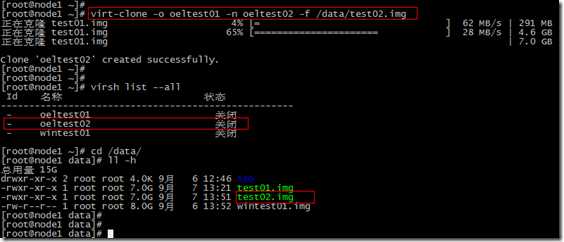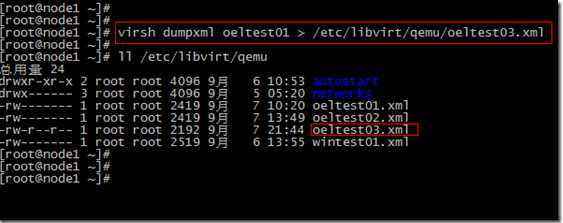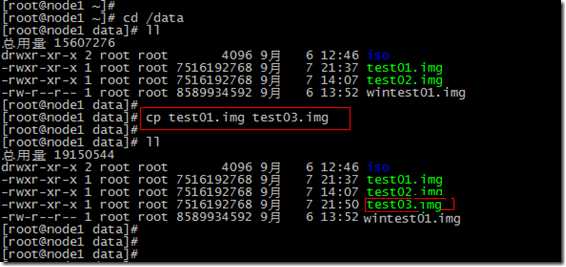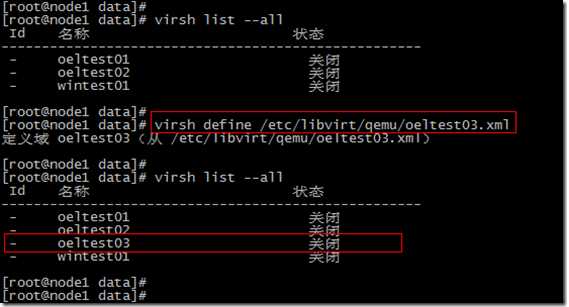kvm虚拟机的克隆
Posted saryli
tags:
篇首语:本文由小常识网(cha138.com)小编为大家整理,主要介绍了kvm虚拟机的克隆相关的知识,希望对你有一定的参考价值。
kvm虚拟机的克隆分为两种情况
(1) KVM主机本机虚拟机直接克隆。
(2) 通过复制配置文件与磁盘文件的虚拟机复制克隆(适用于异机的静态迁移)。
1. 本机虚拟机直接克隆
(1) 查看虚拟机配置文件
[root@node1 ~]# cat /etc/libvirt/qemu/oeltest01.xml
<!-- WARNING: THIS IS AN AUTO-GENERATED FILE. CHANGES TO IT ARE LIKELY TO BE OVERWRITTEN AND LOST. Changes to this xml configuration should be made using: virsh edit oeltest01 or other application using the libvirt API. --> <domain type=‘kvm‘> <name>oeltest01</name> <uuid>8f2bb4a7-c7ed-32aa-3676-9fb05923269d</uuid> <memory unit=‘KiB‘>524288</memory> <currentMemory unit=‘KiB‘>524288</currentMemory> <vcpu placement=‘static‘>1</vcpu> <os> <type arch=‘x86_64‘ machine=‘rhel6.4.0‘>hvm</type> <boot dev=‘hd‘/> </os> <features> <acpi/> <apic/> <pae/> </features> <clock offset=‘utc‘/> <on_poweroff>destroy</on_poweroff> <on_reboot>restart</on_reboot> <on_crash>restart</on_crash> <devices> <emulator>/usr/libexec/qemu-kvm</emulator> <disk type=‘file‘ device=‘disk‘> <driver name=‘qemu‘ type=‘raw‘ cache=‘none‘/> <source file=‘/data/test01.img‘/> <target dev=‘hda‘ bus=‘ide‘/> <address type=‘drive‘ controller=‘0‘ bus=‘0‘ target=‘0‘ unit=‘0‘/> </disk> <disk type=‘block‘ device=‘cdrom‘> <driver name=‘qemu‘ type=‘raw‘/> <target dev=‘hdc‘ bus=‘ide‘/> <readonly/> <address type=‘drive‘ controller=‘0‘ bus=‘1‘ target=‘0‘ unit=‘0‘/> </disk> <controller type=‘usb‘ index=‘0‘> <address type=‘pci‘ domain=‘0x0000‘ bus=‘0x00‘ slot=‘0x01‘ function=‘0x2‘/> </controller> <controller type=‘ide‘ index=‘0‘> <address type=‘pci‘ domain=‘0x0000‘ bus=‘0x00‘ slot=‘0x01‘ function=‘0x1‘/> </controller> <interface type=‘bridge‘> <mac address=‘52:54:00:82:39:01‘/> <source bridge=‘br0‘/> <model type=‘virtio‘/> <address type=‘pci‘ domain=‘0x0000‘ bus=‘0x00‘ slot=‘0x03‘ function=‘0x0‘/> </interface> <serial type=‘pty‘> <target port=‘0‘/> </serial> <console type=‘pty‘> <target type=‘serial‘ port=‘0‘/> </console> <input type=‘tablet‘ bus=‘usb‘/> <input type=‘mouse‘ bus=‘ps2‘/> <graphics type=‘vnc‘ port=‘5910‘ autoport=‘no‘ listen=‘0.0.0.0‘> <listen type=‘address‘ address=‘0.0.0.0‘/> </graphics> <video> <model type=‘cirrus‘ vram=‘9216‘ heads=‘1‘/> <address type=‘pci‘ domain=‘0x0000‘ bus=‘0x00‘ slot=‘0x02‘ function=‘0x0‘/> </video> <memballoon model=‘virtio‘> <address type=‘pci‘ domain=‘0x0000‘ bus=‘0x00‘ slot=‘0x04‘ function=‘0x0‘/> </memballoon> </devices> </domain>
虚拟机磁盘文件: /data/test01.img
虚拟机名称:oeltest01

(2) 开始克隆
# virt-clone -o oeltest01 -n oeltest02 -f /data/test02.img
说明:以oeltest01做为源,克隆oeltest01虚拟机,并创建名称为oeltest02虚拟机,使用磁盘文件/data/test02.img

(3) 启动虚拟机并配置主机名,IP地址等

[root@node1 data]# virsh console oeltest02
连接到域 oeltest02
Escape character is ^]
Found volume group "vg" using metadata type lvm2
2 logical volume(s) in volume group "vg" now active
Welcome to Oracle Linux Oracle Linux Server release 5.8
Press ‘I‘ to enter interactive startup.
Starting udev: [ OK ]
Loading default keymap (us): [ OK ]
Setting hostname test01: [ OK ]
Setting up Logical Volume Management: 2 logical volume(s) in volume group "vg" now active
[ OK ]
Checking filesystems
Checking all file systems.
[/sbin/fsck.ext3 (1) -- /] fsck.ext3 -a /dev/vg/root
/dev/vg/root: clean, 135384/1540096 files, 851398/1540096 blocks
[/sbin/fsck.ext3 (1) -- /boot] fsck.ext3 -a /dev/hda1
/boot: clean, 39/26104 files, 26897/104388 blocks
[ OK ]
Remounting root filesystem in read-write mode: [ OK ]
Mounting local filesystems: [ OK ]
Enabling local filesystem quotas: [ OK ]
Enabling /etc/fstab swaps: [ OK ]
INIT: Entering runlevel: 5
Entering non-interactive startup
Applying Intel CPU microcode update: [ OK ]
Starting background readahead: [ OK ]
Checking for hardware changes [ OK ]
[ OK ] iSCSI daemon: [ OK ]
[ OK ]
Bringing up loopback interface: [ OK ]
Bringing up interface eth0:
Determining IP information for eth0... done.
[ OK ]
Starting auditd: [ OK ]
Starting system logger: [ OK ]
Starting kernel logger: [ OK ]
Starting irqbalance: [ OK ]
iscsid (pid 1555) is running...
Setting up iSCSI targets: iscsiadm: No records found
[ OK ]
Starting portmap: [ OK ]
Starting NFS statd: [ OK ]
Starting RPC idmapd: [ OK ]
Starting system message bus: [ OK ]
Starting o2cb: [ OK ]
[ OK ] Bluetooth services:[ OK ]
Mounting other filesystems: [ OK ]
Starting PC/SC smart card daemon (pcscd): [ OK ]
Starting acpi daemon: [ OK ]
Starting HAL daemon: [ OK ]
Starting hidd: [ OK ]
Starting monitoring for VG vg: 2 logical volume(s) in volume group "vg" monitored
[ OK ]
Starting autofs: Loading autofs4: [ OK ]
Starting automount: [ OK ]
[ OK ]
Starting hpiod: [ OK ]
Starting hpssd: [ OK ]
Starting sshd: [ OK ]
Starting cups: [ OK ]
Starting xinetd: [ OK ]
Starting console mouse services: [ OK ]
Starting crond: [ OK ]
Starting xfs: [ OK ]
Starting anacron: [ OK ]
[ OK ] atd: [ OK ]
Starting background readahead: [ OK ]
Starting yum-updatesd: [ OK ]
Starting Avahi daemon... [ OK ]
Starting smartd: hdc: drive_cmd: status=0x41 { DriveReady Error }
hdc: drive_cmd: error=0x04 { AbortedCommand }
ide: failed opcode was: 0xec
[ OK ]
Oracle Linux Server release 5.8
Kernel 2.6.18-308.el5 on an x86_64
test01 login: mtrr: type mismatch for f0000000,100000 old: uncachable new: write-combining
mtrr: type mismatch for f0000000,400000 old: uncachable new: write-combining
Oracle Linux Server release 5.8
Kernel 2.6.18-308.el5 on an x86_64
test01 login:
Oracle Linux Server release 5.8
Kernel 2.6.18-308.el5 on an x86_64
test01 login: root
Password:
Last login: Sat Sep 7 05:21:11 on ttyS0
[root@test01 ~]#
[root@test01 ~]#
[root@test01 ~]#
2. 复制配置文件与磁盘文件克隆
(1) 导入kvm虚拟机配置文件
这里采用oeltest01做为模板,进行克隆。
# virsh shutdown oeltest01

# virsh dumpxml oeltest01 > /etc/libvirt/qemu/oeltest03.xml

(2) 复制kvm虚拟机磁盘文件
本系列文章都是采用虚拟磁盘文件进行测试,没有使用lvm卷。
通过查看配置文件:虚拟磁盘位置<source file=‘/data/test01.img‘/>

(3) 直接编辑修改配置文件
修改name,uuid,disk位置,vnc端口
此时还是将该配置文件注册进来,无法通过virsh edit进行编辑。
[root@node1 data]# vi /etc/libvirt/qemu/oeltest03.xml
<domain type=‘kvm‘> <name>oeltest03</name> <uuid>8f2bb4a7-c7ed-32aa-3676-9fb05923260d</uuid> <memory unit=‘KiB‘>524288</memory> <currentMemory unit=‘KiB‘>524288</currentMemory> <vcpu placement=‘static‘>1</vcpu> <os> <type arch=‘x86_64‘ machine=‘rhel6.4.0‘>hvm</type> <boot dev=‘hd‘/> </os> <features> <acpi/> <apic/> <pae/> </features> <clock offset=‘utc‘/> <on_poweroff>destroy</on_poweroff> <on_reboot>restart</on_reboot> <on_crash>restart</on_crash> <devices> <emulator>/usr/libexec/qemu-kvm</emulator> <disk type=‘file‘ device=‘disk‘> <driver name=‘qemu‘ type=‘raw‘ cache=‘none‘/> <source file=‘/data/test03.img‘/> <target dev=‘hda‘ bus=‘ide‘/> <address type=‘drive‘ controller=‘0‘ bus=‘0‘ target=‘0‘ unit=‘0‘/> </disk> <disk type=‘block‘ device=‘cdrom‘> <driver name=‘qemu‘ type=‘raw‘/> <target dev=‘hdc‘ bus=‘ide‘/> <readonly/> <address type=‘drive‘ controller=‘0‘ bus=‘1‘ target=‘0‘ unit=‘0‘/> </disk> <controller type=‘usb‘ index=‘0‘> <address type=‘pci‘ domain=‘0x0000‘ bus=‘0x00‘ slot=‘0x01‘ function=‘0x2‘/> </controller> <controller type=‘ide‘ index=‘0‘> <address type=‘pci‘ domain=‘0x0000‘ bus=‘0x00‘ slot=‘0x01‘ function=‘0x1‘/> </controller> <interface type=‘bridge‘> <mac address=‘52:54:00:82:39:11‘/> <source bridge=‘br0‘/> <model type=‘virtio‘/> <address type=‘pci‘ domain=‘0x0000‘ bus=‘0x00‘ slot=‘0x03‘ function=‘0x0‘/> </interface> <serial type=‘pty‘> <target port=‘0‘/> </serial> <console type=‘pty‘> <target type=‘serial‘ port=‘0‘/> </console> <input type=‘tablet‘ bus=‘usb‘/> <input type=‘mouse‘ bus=‘ps2‘/> <graphics type=‘vnc‘ port=‘5911‘ autoport=‘no‘ listen=‘0.0.0.0‘> <listen type=‘address‘ address=‘0.0.0.0‘/> </graphics> <video> <model type=‘cirrus‘ vram=‘9216‘ heads=‘1‘/> <address type=‘pci‘ domain=‘0x0000‘ bus=‘0x00‘ slot=‘0x02‘ function=‘0x0‘/> </video> <memballoon model=‘virtio‘> <address type=‘pci‘ domain=‘0x0000‘ bus=‘0x00‘ slot=‘0x04‘ function=‘0x0‘/> </memballoon> </devices> </domain>
(4) 定义新虚拟机配置文件
[root@node1 data]# virsh define /etc/libvirt/qemu/oeltest03.xml

启动虚拟机
[root@node1 data]# virsh start oeltest03
(5) 登录虚拟机进行主机名,IP等修改
[root@node1 data]# virsh console oeltest03 连接到域 oeltest03 Escape character is ^] Oracle Linux Server release 5.8 Kernel 2.6.18-308.el5 on an x86_64 test01 login: mtrr: type mismatch for f0000000,100000 old: uncachable new: write-combining mtrr: type mismatch for f0000000,400000 old: uncachable new: write-combining Oracle Linux Server release 5.8 Kernel 2.6.18-308.el5 on an x86_64 test01 login: root Password: Last login: Sat Sep 7 05:21:11 on ttyS0
[root@test01 ~]#
[root@test01 ~]#
修改主机名
# vi /etc/hosts # Do not remove the following line, or various programs # that require network functionality will fail. 127.0.0.1 test03 localhost.localdomain localhost ::1 localhost6.localdomain6 localhost6
# vi /etc/sysconfig/network
NETWORKING=yes NETWORKING_IPV6=no HOSTNAME=test03 GATEWAY=192.168.233.2
修改IP地址
# vi /etc/sysconfig/network-script/ifcfg-eth0 # Virtio Network Device DEVICE=eth0 BOOTPROTO=static ONBOOT=yes HWADDR=52:54:00:56:bd:3b IPADDR=192.168.233.143 NETMASK=255.255.255.0
service network restart
Shutting down interface eth0: [ OK ] Shutting down loopback interface: [ OK ] Bringing up loopback interface: [ OK ] Bringing up interface eth0: [ OK ]
本文克隆的虚拟机是oel5.8,如果克隆的虚拟机是RHEL/CentOS/OEL6.x操作系统,还需要修改/etc/udev/rules.d/70-persistent-net.rules文件。
转自:https://blog.51cto.com/koumm/1291793
以上是关于kvm虚拟机的克隆的主要内容,如果未能解决你的问题,请参考以下文章